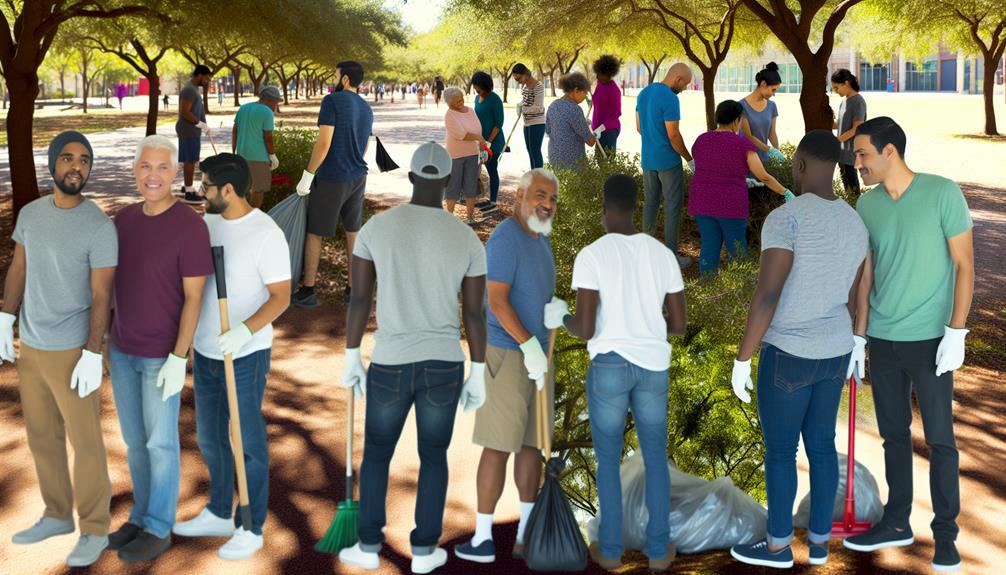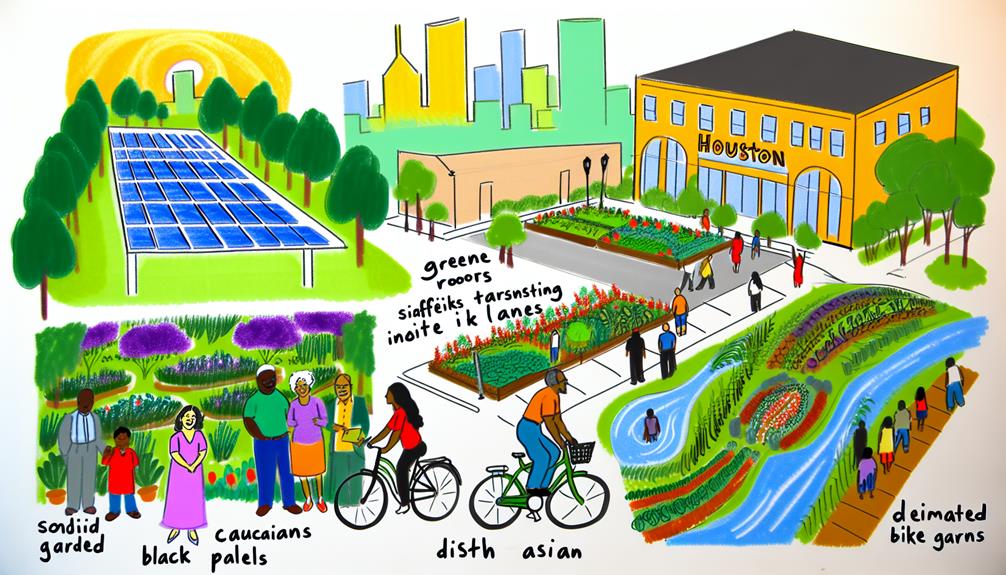Picture Houston navigating through rough waters like a seasoned captain, taking on the challenges of climate change head-on. Just as a skilled sailor adjusts the sails to brave the storm, Houston has unveiled its top climate resilience initiatives to secure its future.
From cutting-edge investments in renewable energy to strengthening urban infrastructure, each initiative plays a vital role in bolstering the city against the impacts of a changing climate.
As we delve into these initiatives, you'll uncover the inclusive strategies in place to ensure Houston stays strong in the face of environmental challenges.
Renewable Energy Investments
Houston's smart investments in renewable energy are playing a crucial role in cutting down on greenhouse gas emissions and building resilience against climate change. By embracing clean energy technologies like solar farms and wind turbines, Houston is actively championing sustainability and reducing its dependence on fossil fuels. These initiatives not only help in creating a cleaner and more eco-friendly energy grid but also serve as a shining example for other cities looking to follow suit.
Investing in solar farms allows Houston to tap into the abundant sunlight in the region to produce clean electricity. Similarly, wind turbines take advantage of the city's breezy conditions to generate renewable energy. By diversifying its energy sources and ramping up renewable energy production, Houston is taking significant strides towards a more sustainable future.
Making renewable energy investments a top priority is a key part of Houston's comprehensive strategy to tackle climate change. By focusing on clean energy solutions, the city isn't only shrinking its carbon footprint but also guaranteeing a more environmentally conscious and sustainable energy landscape for future generations.
Urban Infrastructure Enhancements
Improving Houston's urban infrastructure involves taking smart steps to make the city more resilient to the challenges posed by climate change. Houston is working on raising infrastructure above flood levels to reduce the risk of flooding effectively.
The city is also focusing on incorporating green stormwater systems, which are crucial for boosting urban resilience. Projects such as weatherproofing homes and planting numerous trees are key elements of Houston's efforts to combat climate change, ultimately helping the city move towards becoming more environmentally friendly.
Moreover, activities like heat mapping and transitioning public and private transportation to electric vehicles are part of Houston's urban development plans, in line with the objectives outlined in the Houston Climate Action Plan. Mayor Sylvester Turner emphasizes the importance of taking proactive steps to fortify Houston against the impacts of climate change, highlighting the continual need to enhance infrastructure to cut down on greenhouse gas emissions and support the city's shift towards cleaner energy sources.
These initiatives are all geared towards making Houston a sustainable and climate-resilient city for the years ahead.
Emission Reduction Advocacy

Advocating for emission reduction through a Carbon Fee and Dividend approach is crucial in helping Houston achieve its goal of cutting greenhouse gas emissions by 40% by 2030. By pushing for this strategy, we can drive significant progress in the fight against climate change. Here's why this advocacy matters:
- Carbon Fee and Dividend: Introducing a Carbon Fee and Dividend system can effectively motivate industries and individuals in Houston to lower their greenhouse gas emissions. This method aligns with Houston's Climate Action Plan and has the potential to bring about substantial reductions in carbon dioxide equivalent emissions.
- Sector-Specific Targets: Concentrating on sectors like transportation and buildings, which are major contributors to emissions, is key to reaching Houston's emission reduction targets. By advocating for tailored approaches within these sectors, Houston can move closer to a greener future.
- Per Capita Emission Reduction: Advocacy focused on reducing per capita greenhouse gas emissions can play a vital role in meeting Houston's overall emission reduction objectives. Educating and involving the community in emission reduction practices can have lasting positive effects on the city's carbon footprint.
Ecosystem Protection Measures
To really boost environmental sustainability in Houston, we need to focus on protecting our ecosystems. Houston's efforts to protect our ecosystems are crucial in fighting climate change and building resilience. By working on projects to restore our coasts, preserving habitats, and planting more trees, our city actively helps with carbon capture and boosts biodiversity.
Protecting wetlands and green spaces not only helps prevent flooding but also provides vital support for local wildlife. Our conservation programs are all about safeguarding natural resources and promoting sustainable urban development, finding a balance between human activities and nature. These initiatives are all aimed at reducing our greenhouse gas emissions, especially carbon dioxide per person, making Houston a standout leader in environmental stewardship across Texas.
Check out the summary below for a quick look at the key ecosystem protection measures happening in Houston:
- Coastal Restoration Projects: Preserving crucial habitats along the coast to enhance biodiversity and climate resilience.
- Tree Planting Programs: Contributing to carbon sequestration and improving the environment, which leads to a reduced carbon footprint and better air quality.
- Wetlands and Green Spaces: Helping to prevent floods and supporting local wildlife, providing natural flood control and habitat protection.
- Conservation Programs: Safeguarding natural resources and promoting sustainable urban development for better ecosystem and resource management.
Extreme Weather Preparedness

When it comes to tackling the challenges posed by extreme weather, it's crucial for cities to take proactive steps to boost resilience and safeguard their communities. Houston, for example, has grappled with six major flooding disasters since 2015, highlighting the urgent need for strong flood prevention initiatives.
To better prepare the city for future floods, here are some key actions that can be pursued:
- Utilize Community Development Block Grant Mitigation Program: By tapping into the resources available through this program, Houston can make significant progress in carrying out vital flood mitigation projects, making the city more resilient to severe weather events.
- Support Greater Houston Partnership's Projects: Backing the flood mitigation projects proposed by the Greater Houston Partnership is crucial for strengthening Houston's ability to bounce back from disasters and protecting its most vulnerable neighborhoods.
- Give Priority to the Coastal Barrier Project (Ike Dike): The Ike Dike initiative plays a critical role in warding off storm surges and safeguarding areas along the Gulf Coast, including the vital Houston Ship Channel. Investing in this project isn't just about community safety; it's also a smart move to prevent potentially massive costs for disaster recovery down the line.
Frequently Asked Questions
What Is Houston Doing About Climate Change?
Hey there! Ever wondered what Houston is doing about climate change? Well, they've set ambitious goals to slash emissions by 40% by 2030 and aim to achieve carbon neutrality by 2050. Their game plan includes raising buildings, boosting green infrastructure, planting more trees, and embracing clean energy technology to build up their resilience. It's impressive to see these proactive steps towards a greener and more sustainable future!
What Is the City of Houston Resilience Plan?
The City of Houston Resilience Plan is all about getting ready for wild weather. They're working on beefing up the city's infrastructure and making sure folks are prepared for any extreme conditions that come their way. This plan covers everything from cutting flood risks to upgrading drainage systems and pushing for more green spaces to handle water, all with an eye on adapting to climate change for a stronger tomorrow.
How Has Houston Adapted to the Environment?
Wow, Houston is really stepping up its game to tackle the challenges posed by the environment! The city's approach involves boosting buildings, encouraging green infrastructure, weatherproofing homes, planting more trees, conducting heat mapping, and transitioning to electric fleets. Mayor Turner is leading the charge with proactive steps to ensure that Houston is well-prepared to handle climate changes effectively.
What Is the Houston Climate Equity Plan?
The Houston Climate Equity Plan is all about making sure everyone is treated fairly when it comes to tackling climate issues. This plan focuses on bridging the gap in how different groups are affected by climate change. By involving marginalized communities and making sure resources are distributed fairly, the goal is to level the playing field and ensure everyone has a fair shot at dealing with climate challenges.
